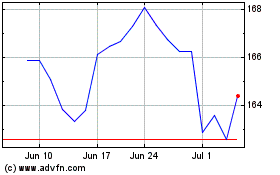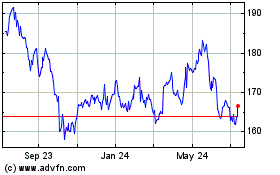Two years after a levy of about 10% sparked a decline, the
numbers are rising once again
By Amy Guthrie in Mexico City and Mike Esterl in Atlanta
Sales of soda are climbing two years after Mexico imposed a
roughly 10% tax on sugary drinks -- a bright spot for an industry
that has feared it could be cast as the next tobacco.
Mexico's tax was an attempt to cap alarming obesity and diabetes
rates in a country where per capita soda consumption is the highest
in the world. It came at a time when then Mayor Michael Bloomberg
was trying to limit sales of the beverages in New York City, and
more countries are weighing a similar tax.
Purchases, however, are rising in Mexico after an initial drop,
making the country a key-growth market again for soda giants
Coca-Cola Co. and PepsiCo Inc.
Underscoring the resiliency of sugary drinks, the tax of one
peso per liter has raised more than $2 billion since January 2014,
about a third more than the government expected.
"Coke is like cigarettes -- it turns you into an addict," said
Luis de León, a 24-year-old Mexico City parking attendant, who
stood next to a three-liter bottle he recently shared with two
other valets.
Mr. de León said he stopped drinking soda for a month after
seeing a publicity campaign financed by Bloomberg Philanthropies
that linked diabetes to sugary beverages and asked Mexicans if they
would eat 12 spoonfuls of sugar, roughly the amount in Coke's
popular 600-milliliter bottle.
While that public-health campaign is long gone, soda makers
continue to advertise their products heavily and say it is unfair
to single out something representing less than 10% of daily caloric
intake.
Coca-Cola Femsa SAB, the country's largest Coke bottler, said
last Wednesday that its Mexican soda volumes rose 5.5% in the first
quarter from a year earlier. Arca Continental SAB, the No. 2 Coke
bottler, reported soda volumes surged 11%.
The turnaround began last year, when Mexican soda-industry
volume rose 0.5% after falling 1.9% in 2014, said data service
Canadean.
Consumers also aren't flocking to untaxed zero-calorie sodas.
The market shares of full-calorie Coca-Cola and Pepsi-Cola inched
higher last year to 48% and 11%, respectively, according to
Euromonitor, another data service.
Antisoda groups aren't ready to declare the tax a failure and
say sales got a boost from unusually warm weather.
Mexico's National Institute of Public Health estimates per
capita consumption of sugar-sweetened beverages was 8% lower in
2015 than the pretax period of 2007 to 2013, after making
adjustments including population growth and economic activity.
Soda sales growth is slowing world-wide, with volumes rising
just 0.1% last year, according to Euromonitor. Companies such as
Coke and PepsiCo increasingly are relying on other products like
bottled water, whose global volumes were up 5.7% last year.
A World Health Organization commission recommended in January
that governments tax sugar-added beverages to reduce childhood
obesity, citing a joint study by Mexican health officials and the
University of North Carolina.
That peer-reviewed survey estimated 2014 purchases of sugary
beverages dropped 6% from the average of the previous two years. It
found the decline accelerated to 12% in the final month of 2014
from the previous two Decembers.
Several countries are debating special taxes on sodas including
India, South Africa and the Philippines. In the U.S.,
Philadelphia's mayor has proposed a 3-cent-per-ounce tax on
sweetened beverages.
The American Beverage Association is fighting that proposal and
plans to highlight a new study that found Mexico's beverage
industry lost about 3,000 jobs in the first quarter of 2014 due to
the tax. The survey, conducted by the Beverage Marketing Corp.,
estimates Mexican soda consumption returned to pretax levels by
mid-2015.
Even the initial downturn only lowered the average Mexican's
daily caloric intake by 6 to 7 calories, or 0.2%, according to the
study.
"We know these taxes don't work," said Coke Chief Executive
Muhtar Kent at a company's annual shareholder meeting last
Wednesday, pointing to Mexico.
Governments also must spend money to raise awareness about sugar
intake, require clear nutritional labels and encourage exercise,
among other things, health experts say.
"The sugar tax is an important piece but not the only one," said
Kelly Henning, who heads the public-health program at Bloomberg
Philanthropies.
Mr. Bloomberg also unsuccessfully tried to cap serving sizes of
sugary drinks as mayor of New York City.
Supporters of sugary-drink taxes say Mexico's levy should be
higher to have a bigger impact. Senator Armando Ríos Piter wants to
double the tax to offset the rising public-health cost of treating
people with diabetes, a disease that disproportionately affects
poor Mexicans, who buy the majority of sugary beverages.
Wilebaldo Ramírez, a 45-year-old shoe shiner in Mexico City,
said he allocates about 6% of his daily wages to soda even though
his wife has been pestering him to drink bottled water.
"If water was cheaper than soda, maybe I'd switch. But in the
meantime I want flavor," said Mr. Ramirez, after polishing off a
600-milliliter bottle of fruit-punch flavored Jarritos, a local
soda brand.
The bottle sells for 6.50 pesos (about 37 cents) at a store near
his shoe-shine stand, compared with at least 8 pesos for the same
size of bottled water.
Write to Amy Guthrie at amy.guthrie@wsj.com and Mike Esterl at
mike.esterl@wsj.com
(END) Dow Jones Newswires
May 04, 2016 02:49 ET (06:49 GMT)
Copyright (c) 2016 Dow Jones & Company, Inc.
PepsiCo (NASDAQ:PEP)
Historical Stock Chart
From Mar 2024 to Apr 2024

PepsiCo (NASDAQ:PEP)
Historical Stock Chart
From Apr 2023 to Apr 2024
